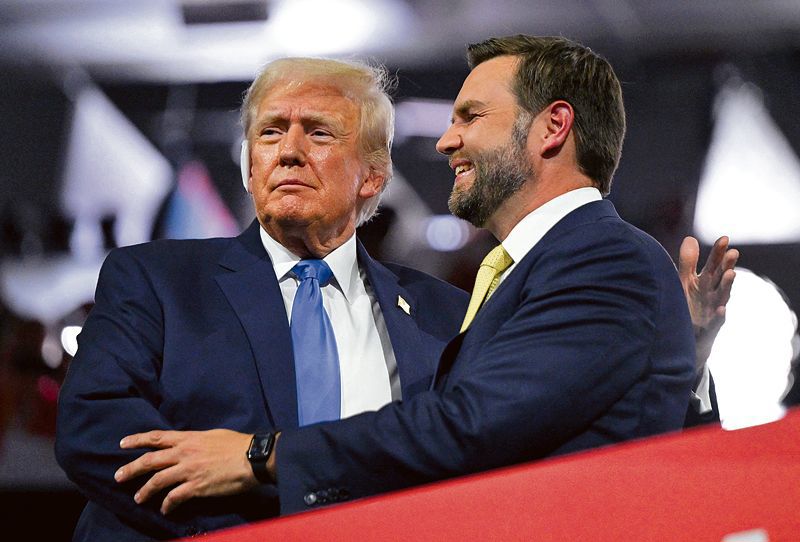Vance can make a difference in the swing states
ON July 15, former US President and the Republican Party’s presidential nominee Donald Trump announced that JD Vance, a 39-year-old Senator from Ohio, would be his running mate. Two days later, the party formally anointed him as its nominee for the Vice-President’s post in the presidential elections to be held in November. Vance has been a Senator for only a year and a half. He is, therefore, a comparative political novice. Why has Trump chosen him?
Traditionally, a US Vice-President is always under the shadow of the President. Beyond his constitutional role as President of the Senate, the Upper House of the US Congress, a Vice-President performs whatever work the President assigns to him. His political influence is dependent on his relationship with the President. Vance’s supporters perhaps convinced Trump that he would never do a Mike Pence on him. Also, Vice-Presidents are not Washington power-brokers and seldom attract political attention in the US or abroad. This is all the more so in Vance’s case as he is new to politics.
Vance is married to Usha Chilukuri, who has roots in India. Her parents, Krish and Lakshmi Chilukuri, migrated to the US from Andhra Pradesh in 1980. Krish is an aerospace engineer, while Lakshmi is marine molecular biologist and biochemist. Usha, born in 1986, grew up in San Diego, California, and went on to study at Yale Law School. Vance and she were in the same class. They fell in love and got married in 2014. They come from entirely different backgrounds but share a very strong bond. They have three children.
Usha has had a distinguished academic career. She studied history at Cambridge University. She was a law clerk for US Supreme Court Chief Justice John Roberts and Judge Brett Kavanaugh. She was a lawyer with a well-known legal firm but gave up the job on Vance’s selection by Trump as his running mate.
Vance’s nomination for the Vice-President’s post has attracted substantial media attention in India because of his wife’s parents’ Indian origin. There is no evidence on record to show that Usha has an affinity for India, though she remains, by all accounts, a Hindu. While some second-generation Americans of Indian origin develop an enduring interest in the country of origin of their parents, the primary drive of others is to fully immerse themselves into the American life. For some, this includes politics, where a few have distinguished themselves in both parties. It is, therefore, always wrong to assume that every second-generation American with Indian roots has a natural inclination towards India. First-generation Indians generally take a greater interest in India’s causes and have developed strong lobbies to influence the US system.
Vance came to US national attention in 2016 when, at 32, he published a largely autobiographical book, Hillbilly Elegy, which was made into a movie in 2020. He vividly and insightfully described the poverty, deprivation and retrogressive culture of the hill folk of Appalachia, which was and remains arguably the most backward part of the US. He dwelt on the traumas of his childhood and youth amidst family violence, alcoholism and drug abuse. His mother was an addict, and his early years were chaotic but they mirrored what he noted was the life of the hillbillies. As he puts it evocatively: “Chaos begets chaos. Instability begets instability. Welcome to the life of the American hillbilly”. He finally found stability in the home of his maternal grandmother who was a tough character and had moved with her husband to Middletown, Ohio, in the early 1950s. That was the era when America was a great manufacturing country. The hillbillies had left Appalachia but carried their traits with them which largely prevented their upward mobility.
Vance joined the Marine Corps and spent four years in it. He was posted to Iraq in the Corps’ Public Affairs Unit. After leaving the Corps, he graduated from Ohio State University in 2009. He had definitely moved out of the hillbilly trap when he was accepted by Yale Law School in 2010, but he had still to be socialised in the ways of successful American professionals. It is here that Usha stepped in. He notes in his book that he couldn’t have fought the ‘old demons’ without her. After Yale, he worked as a lawyer but later joined a venture capitalist firm in California which was owned by the arch-conservative Peter Thiel. It was during these years — when Trump was President — that his views drastically changed. From being a strong Trump critic, he moved to the far right in his views. It is a matter of conjecture if he did well in his venture capital business. He decided to run for the Senate in Ohio on the Republican Party ticket in 2022. Despite his past nastiness to Trump, the former President obviously saw potential in him and endorsed him. He got the Republican nomination for the Senate and won the election.
Vance has taken far-right positions on abortion and immigration, condemned Trump’s prosecution, firmly supported Israel and wants Europe to spend on its defence. He has reportedly said that he does not care about Ukraine. But Trump has not chosen him for these views, which largely coincide with his. He may really want Vance to sway, even if marginally, impoverished voters in the swing states who may be inspired by his life’s success. These small margins may become crucial if the election turns out to be a close contest.
That seems currently unlikely, with the Democrats in disarray and the support for Trump growing after the assassination attempt. But there is no certainty in elections and a young Vance, with a background totally different from Trump’s, will be useful to him. He is a carrier of the Trump torch and may also pose no threat to the political ambitions of the ex-President’s sons. But that is in the future.









